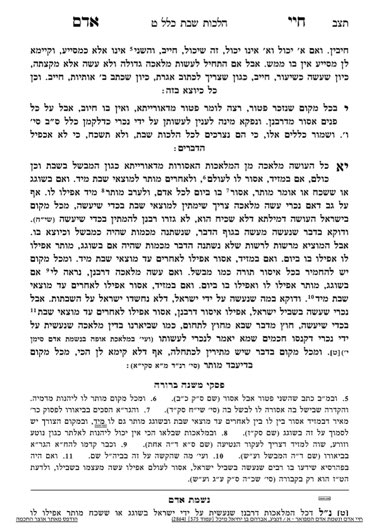We are continuing in siman 10, where we learned the difference between patur and muttar. In siman 340, the Biur Halacha points out that the halacha is that chatzi shiur is patur. Based on our understanding of the word patur, chatzi shiur should only be assur miderabanan, which is in accordance with the opinion of Reish Lakish in the Gemara. However, we pasken like Rav Yochanan, that chatzi shiur is assur mideoraysa.
It could be argued that we only pasken in accordance with Rav Yochanan when it comes to issurim related to food, and when it comes to other issurim (such as Shabbos), we pasken it is assur miderabanan. However, the Biur Halacha rejects this argument by bringing multiple proofs that the issur of chatzi shiur is deoraysa even when it comes to Shabbos.
The Biur Halacha explains that when the Gemara tells us that the word patur refers to actions which are still assur miderabanan, the point of the Gemara is not that the word patur means assur miderabanan inasmuch as it means that it is not muttar on the one hand and not chayav a korban on the other hand. The level of issur can vary, but it will certainly be at least assur miderabanan. The general assumption when we see the word patur in conjunction with hilchos Shabbos is that it refers to assur miderabanan, but the Biur Halacha is teaching us that it may be referring to assur mideoraysa as well.
When the Rambam (Shabbos 1:3) brings this rule, he writes that the purpose of issurei derabanan are to help a person distance themselves from a concern of melacha deoraysa.
The meforshim in the Gemara discuss whether this idea that patur means the action is still assur is limited to hilchos Shabbos, or whether it applies to the rest of the Torah as well. The Lechem Mishneh holds that it is unique to Shabbos and does not apply to other issurim. He suggests that the Rambam writes that the purpose of issurei derabanan are to help a person distance themselves from melacha deoraysa specifically because there is a greater concern to distance a person from melacha more than when it comes to other issurim. Therefore, in the rest of the Torah, patur can mean muttar, and it is only when it comes to hilchos Shabbos that patur means assur.
Summary
- In hilchos Shabbos, the term patur generally indicates something is not assur mideoraysa, but rather assur miderabanan. However, it can also refer to an issur deoraysa, and comes to exclude something being completely muttar or chayav a korban.
- This rule applies only to hilchos Shabbos; in other issurim, patur can mean muttar.



